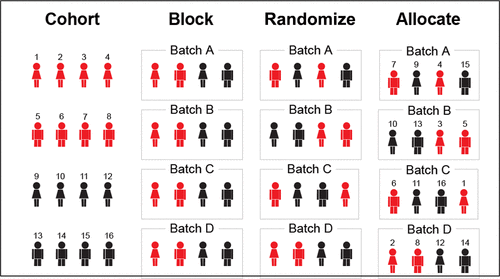当前位置:
X-MOL 学术
›
J. Proteome Res.
›
论文详情
Our official English website, www.x-mol.net, welcomes your
feedback! (Note: you will need to create a separate account there.)
On the importance of block randomisation when designing proteomics experiments.
Journal of Proteome Research ( IF 3.8 ) Pub Date : 2020-09-21 , DOI: 10.1021/acs.jproteome.0c00536 Bram Burger 1, 2 , Marc Vaudel 3 , Harald Barsnes 1, 2
Journal of Proteome Research ( IF 3.8 ) Pub Date : 2020-09-21 , DOI: 10.1021/acs.jproteome.0c00536 Bram Burger 1, 2 , Marc Vaudel 3 , Harald Barsnes 1, 2
Affiliation

|
Randomization is used in experimental design to reduce the prevalence of unanticipated confounders. Complete randomization can however create imbalanced designs, for example, grouping all samples of the same condition in the same batch. Block randomization is an approach that can prevent severe imbalances in sample allocation with respect to both known and unknown confounders. This feature provides the reader with an introduction to blocking and randomization, and insights into how to effectively organize samples during experimental design, with special considerations with respect to proteomics.
中文翻译:

关于设计蛋白质组学实验时分组随机化的重要性。
实验设计中使用随机化来减少意外混杂因素的发生率。然而,完全随机化可能会产生不平衡的设计,例如,将相同条件的所有样本分组在同一批次中。分块随机化是一种可以防止已知和未知混杂因素的样本分配严重不平衡的方法。此功能向读者介绍了封闭和随机化,并深入了解如何在实验设计过程中有效组织样本,并特别考虑蛋白质组学。
更新日期:2020-09-21
中文翻译:

关于设计蛋白质组学实验时分组随机化的重要性。
实验设计中使用随机化来减少意外混杂因素的发生率。然而,完全随机化可能会产生不平衡的设计,例如,将相同条件的所有样本分组在同一批次中。分块随机化是一种可以防止已知和未知混杂因素的样本分配严重不平衡的方法。此功能向读者介绍了封闭和随机化,并深入了解如何在实验设计过程中有效组织样本,并特别考虑蛋白质组学。











































 京公网安备 11010802027423号
京公网安备 11010802027423号